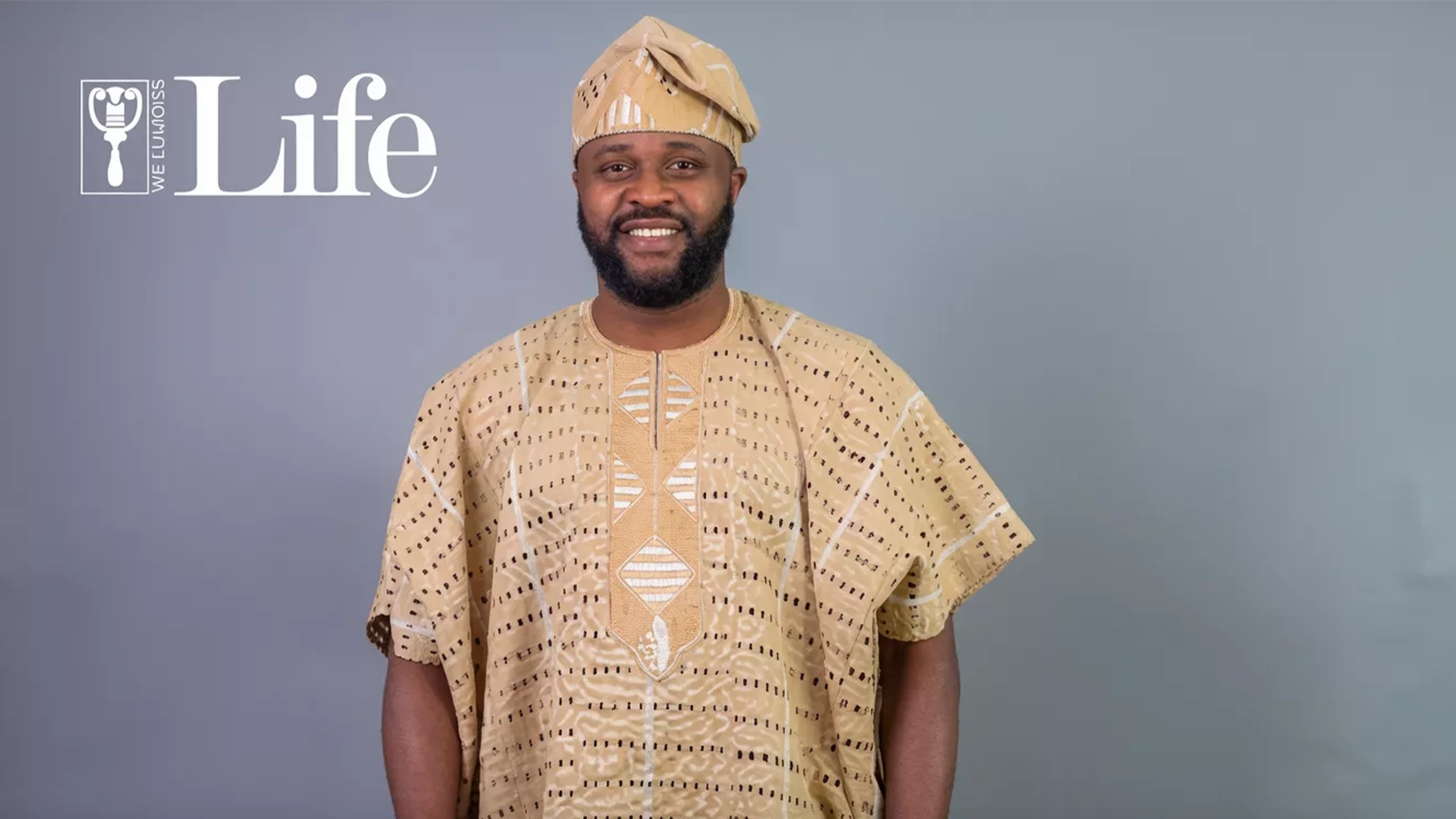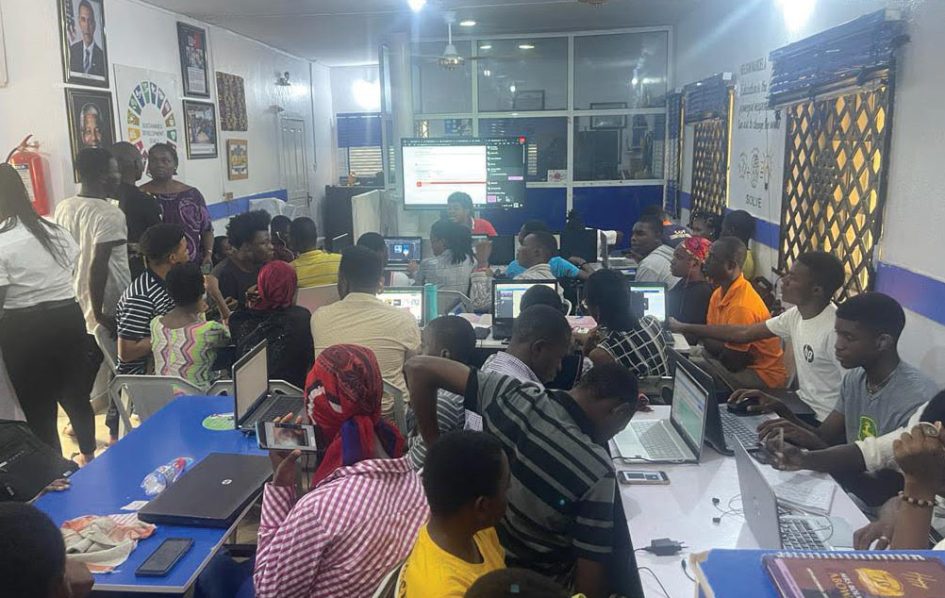
The United Nations set aside July 15 every year to mark World Youth Skills Day in celebration of the strategic importance of equipping young people with skills for employment, decent work, and entrepreneurship. In commemoration of the day, IJEOMA THOMAS-ODIA visited the Community Innovation Hub (CIH) in Lagos State and interacted with trainees and experts at the Hub on what they are doing to help young people retool and bring themselves up to speed with the demands of modern-day workplaces. The report also sheds light on how educational institutions can upskill to produce graduates that are job creators and not job seekers.
Twenty-year-old Titilayo Daniyan is one of the students of the Community Innovation Hub (CIH) located in the Ipaja area of Lagos State. The outfit focuses on coding, robotics, web development, 3D and virtual reality in its efforts to raise a community of problem solvers and innovators.
Although not from a privileged background, Daniyan’s smartness and openness to learning have helped her gain new skills and she is now hoping to become a software engineer.
Narrating how she got enrolled at the facility to The Guardian, Daniyan said: “I attended Meiran Community High School and I was the head girl of the school. Because of my academic ability, my chemistry teacher, Ms. Chilaka, a partner at the Hub, saw the potential in me and asked what I would like to do after school. I wanted to either be a waitress or own a Point of Sales machine. All I had in my mind was to make money to support my family, as my mum is the only one catering for us; my dad is late.
“My teacher asked if I would like to learn about technology. Before then I had always had an interest in doing that. So, when she brought me to the hub, I was given the privilege to learn for free. Today, I can boldly call myself a 3D inorganic modeling expert. It has to do with building objects in 3D form. I also have an interest in architecture because my dad was an architect. Seeing that there is an app that allows you to build houses in a 3D mode before it comes to real life caught my attention.”
Daniyan was one of the young people who met with Bill Gates during his visit to Nigeria recently. She also shared her experience during the meeting with Gates, stating that it allowed her to pitch her project personally to him.
“He was impressed and asked if I was in a tertiary institution. I told him no and added that I wanted to get into either Harvard or MIT as they will help me get better,” she added.
She developed the ambition as a result of the knowledge and exposure that she has gained at CIH. She disclosed to The Guardian that in almost two years of her study at the hub, she has developed two apps.
Hear her: “The first is on Enlighten Virtual Reality; it is a virtual space where students and teachers connect from wherever they are. I come from an underserved community and we were over 100 students in a very small classroom. We were all stuck there without proper chairs. Students had to use nails and planks to produce makeshift benches to sit on.
“In a day, we could have two students faint in the class from suffocation. So, with Enlighten VR the number of students who should come to school can be limited as students can learn from anywhere they are.”
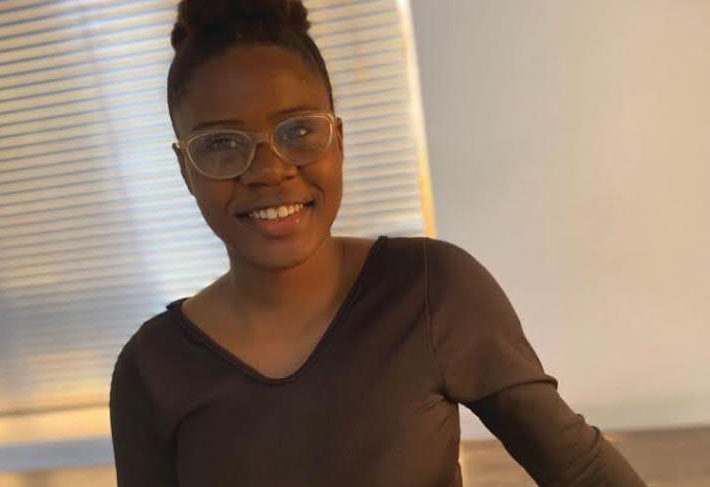
Her second app, Learn SDG is spurred by the need to help young people learn about the SDGs at the click of a button. “I have not seen an app dedicated to teaching people about the SDGs, and with the goals targeted at 2030, it means we have seven years to go. So, my contribution is to develop an app to help people have access to the goals, learn about them, and give back to their communities based on the goals,” she added.
Another student at the Hub, Adeyemi Adekojo, is passionate about robotics. According to him, from childhood, he knew that he wanted to do robotics even though he didn’t understand the concept at the time.
He recalled: “Some time ago, I was discussing with some students who came to my school, and I talked about what I wanted to create and develop. They made me understand it was robotics. I didn’t know what it meant. So, I researched and realised that it is a combination of mechanical engineering, electronics engineering, and computer science.
“While in secondary school, I felt that pure science would be it; so when I realised that I needed some technical knowledge as it relates to engineering, I had to switch. Due to my passion, I would gather children in my neighbourhood and buy them sweets so they could learn what I had to teach (robotics) till I found out about the hub. It helped me focus my energy on developing it and it became easier for me. I have also learnt problem-solving skills, communication, and how to use Microsoft Excel.”
He disclosed that he was working on an app in partnership with Microsoft for the visually impaired. “The app will help them to understand their environment and move confidently. For me, this app is solving an SDG on Good Health and Wellbeing.”
Another young programmer, Olorundare Ayomide, said the hub has allowed him to learn about life, entrepreneurship, and SDG goals. “I love programming and I am eager to fight cybercrime. I want to create a website around chatting. I love people connected,” he said.
A message on the UN website on World Youth Skills Day noted that technological advancements and shifting labour market dynamics increasingly call for agile and adaptable skill sets.
“It is crucial that we empower young people to navigate these changes effectively. Technical and vocational education and training (TVET) is well placed to meet these demands by reducing access barriers to the world of work, ensuring that skills gained are relevant, recognised, and certified, promoting green skills and practices, and offering skills development opportunities for youth who are not in education, employment and training.
“On World Youth Skills Day, let us unite in recognising the potential of young people as catalysts for change and commit to providing them with the skills and opportunities they need to build a prosperous and sustainable world for all. Together, we can shape a brighter future where no young person is left behind.”
Co-founder of the CIH, Soji Megbowon, a Microsoft innovation specialist and Lagos State Best Teacher award winner, answered this call about five years ago.
He told The Guardian that he established the centre after he saw the need to transform the lives of youths with a focus on technology.
“In 2014, I organised some free masterclasses for teachers, which focused on their all-around improvement. I did it for about three years. Afterward, I realised that now was the time to start using the skills that they had been equipped with – including how to use PowerPoint, Visual Representation, and Content Creation.
“After providing that training, I realised that with the way the world is going, there was a need for us to give the students the skills that matter. So, I started attending training personally to upskill myself. I was privileged to attend one with the British Council and that changed my entire experience,” Megbowon said.
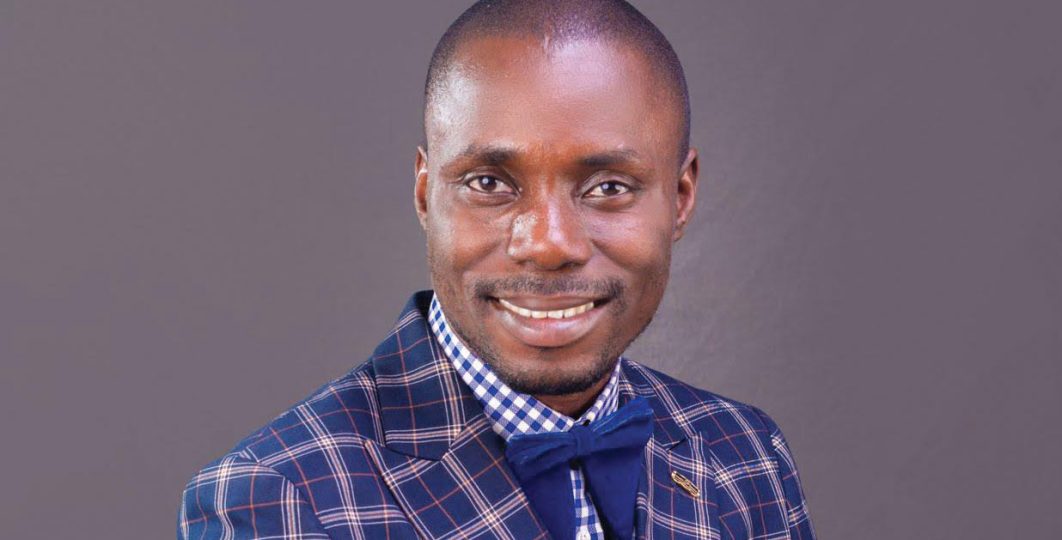
The Computer Science and Mathematics teacher at Abesan Estate Senior High School added: “I also had a training sponsored by the Lagos State Government, called “Critical Thinking Skills” and “Core Skills.” It is about the ability of people to think for themselves. I took it up and then I started to attend and take training, and I wanted to practice something, which was to create a space, a digital space in my school where students could have access to computers.”
Today, the school has, through this support, set up a digital hub to help students to upskill.
Speaking on how he set up the CIH, he said: “I started it in my sitting room. Afterward, I bought about five desktop computers. My wife wasn’t working at the time, so she was into providing basic training. She is also into tech and will take the students during the day while I am at work. We continued for about two years before Google discovered us and began collaborating with us on some community-based training. We did that for five years. Then the need for space arose as some of the students who had finished high school at the time and hadn’t got admission resorted to doing menial jobs in the community. Instead of letting that happen, we thought of ways to add value to out-of-school students.
“Thankfully, I met with my partner, Oseni Adewale Paul, who was my roommate at the Tony Elumelu Fellowship, and we shared our visions. He quit his job to join me here and we have been doing it together for the last five years. God has been faithful.”
Speaking on the need to transform the mindset of young people, he said: “Everything we are doing at our hub is a reflection of our experiences. Back in 2002 when I emerged as the first runner-up at the Maltina Teacher of the Year award, I used the proceeds to set up a hub for my school. So, we introduced our students to the world of innovation and solution-building. It has helped the students in a lot of ways because they now have their track record.
“I have a couple of students who are participating in several top projects outside the country including, fellowships, Mastercard scholarships, and more, and they all came from this school. It is because I introduced them to the world of technology, innovation, and leadership.”
On the need to equip teachers with 21st-century skills, the Global Teacher Prize finalist emphasised that the world is changing, adding that a revolution of new skills is coming up.
“So, we need our teachers to cover up the gap by catching up. Beyond our fields of study, technology is highly important. We need our teachers to become up-to-date with the new advancements. Technology like Chat GPT makes work easier for teachers. It makes my work a lot more seamless. We need to transition from what we know. That’s the most important thing.
“The Lagos State Government is undergoing a revolution of its hiring scheme for teachers, by focusing on recruitment of younger teachers under 40 years, which means the future is bright. The government is becoming critical about how it employs teachers because the world is changing fast and the change is happening in Lagos faster than in other states. If you do not meet up, you will become obsolete,” he said.
Megbowon’s partner at the CIH, Paul, also emphasised that the Nigerian educational system has become outdated, saying their goal is “to have a homegrown solution so that when our young people are out of school, they don’t start looking for jobs; it either job are waiting for them, or they are creating jobs.”
Paul, who is an Edtech advocate, virtual educator, and innovator, added: “An economy that is dependent heavily on another economy is in a moribund state. Nigeria is heavily dependent on imports, even down to some of the things that are supposed to be basics.
“It is alarming when a minister said years ago that Nigeria will start producing pencils in two years; pencils of all things! It is discouraging. While I was in school, there were a few things that were amazing to me that were the norm to several of my colleagues. There is a need to demystify some of these things because when you don’t, they continue to constitute a mystery to students. And they will always look for something that they can understand, and not something that sounds mysterious.
“It is easy for parents to say to their child, ‘You are going to become a doctor.’ They understand that compared to saying, ‘You are going to become a robotic scientist.’ How many robotic scientists do you know in Nigeria? How many robotic factories do we have in Nigeria?
“There is a need for us to begin to create jobs and a need for every young Nigerian to be innovative. We have too many problems in Nigeria for us not to be able to think. The best place to be if you are going to be an innovator is a place where there are so many challenges.”
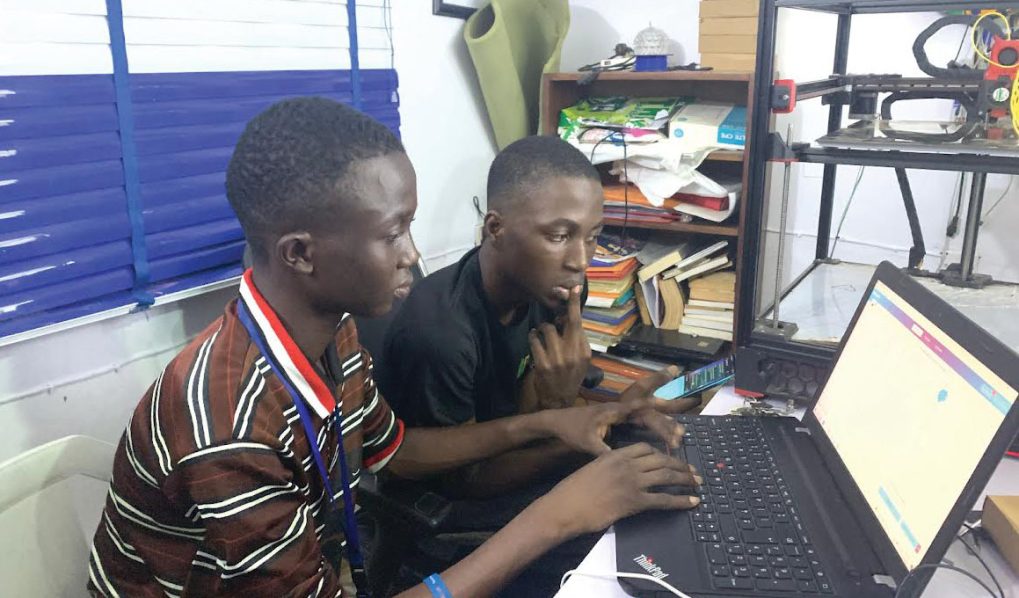
A graduate of Capital University, United States, and an alumnus of the Tony Elumelu Entrepreneurs Programme, Paul stated that his recognition of the need to innovate and solve Nigeria’s problems makes his return to the country each time he travels abroad.
“The same should apply to every young person. There are so many things that we can do right now. My colleague and I decided that things like this have to be common. It has to be a thing that every child has access to; access to quality education, things that surpass their imagination, things that they only get to see in movies. We need to demystify them,” he added.
Speaking on the output of the students, he said: “One of the things that our students have done over time is looking for ways to build something out of the waste around them. We’ve built a pumping machine and so many other amazing things out of waste. All of these things aren’t that difficult, but because there is no access to that information, it seems like it is something impossible.
“We are heavy on SDGs and making Nigeria a better place. We tell our students that when they get the opportunity to go out there, they should not rush to come home. We want them to build themselves up to the point that when they return, they are doing something significant. We have a student who won a Mastercard Scholarship to a school in Rwanda, from where he will head to spend his summer in the U.S. We keep encouraging them to never stop.
“Another student met with the CEO of the World Bank last month. Even while they are out there, they continue to make waves. We had one who was working on a project called ‘Recraft NG’. It was about tailoring waste used in making bags. It was presented at an Innovation Programme organised by the Lagos State Government. We’ve had so many success stories and we want our students to think creatively. We are not just about the theoretical aspect because this is not a university where you are expected to download what your lecturer had given to you. This is a place where you are expected to think. Each of our students is expected to have a solution that they are working on, attached to an SDG.”
Paul noted that a major problem the country has to contend with is the tendency to not allow students to think.
“For example, one of the things that you are going to realise especially in the sciences is that while you have a definition for a term, there are also several other ways that you could arrive at the same point without exactly using your words.
“There were so many things I never understood as a science student while in secondary school until I started practicing. For a start, practicals should be project-based. When you make it practical, you are helping a student to think. When they can think, even what you consider the only way, they end up opening doors to several other options. When we keep saying it is whatever I give to you that you give to me, then you have already configured their thinking pattern to just yours. And then they end up doing the same to the coming generation, and just keep on recycling the process,” he explained.
Paul noted that it is important to train students to create value, saying that they would make good money through that.
“We have a set of graduates seeking to make money. When you create value, you call the shots. It is because employers know that for every job you reject, there are a hundred people who want to take it, so they give you a lowball. But when you are creating value, you won’t even be the one to take your resumé to them, because if they would like to increase their return on investment, they will be the ones to come to you.
“Every student should be trained and allowed to think, and solely pursue value, creating solutions. We do not know what kind of job is going to be relevant in the next 20 years. But we can train students to be innovative in such a way that even when the job changes, they can adapt. It should be as simple as switching roles.”
A mentor at the hub, Olawajerimi Adewale, noted that she came in contact with the hub last year during a long vacation.
“The hub was offering a boot camp programme and one of my children was picked. When I brought her, I decided to become a volunteer since there was a need for extra hands.




